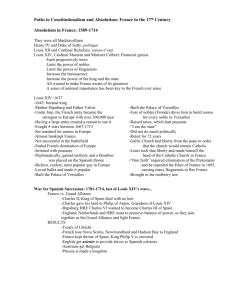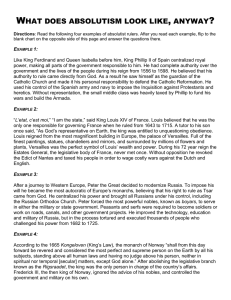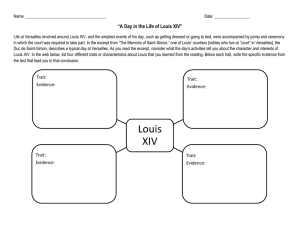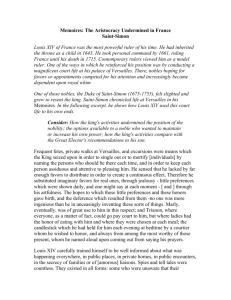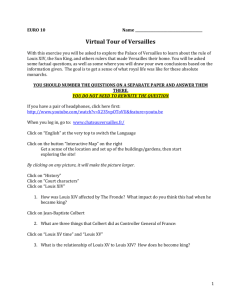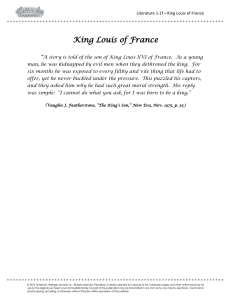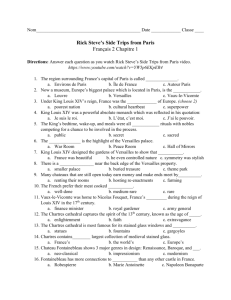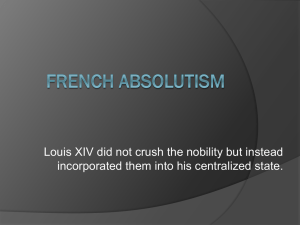Versailles - Series 1
advertisement
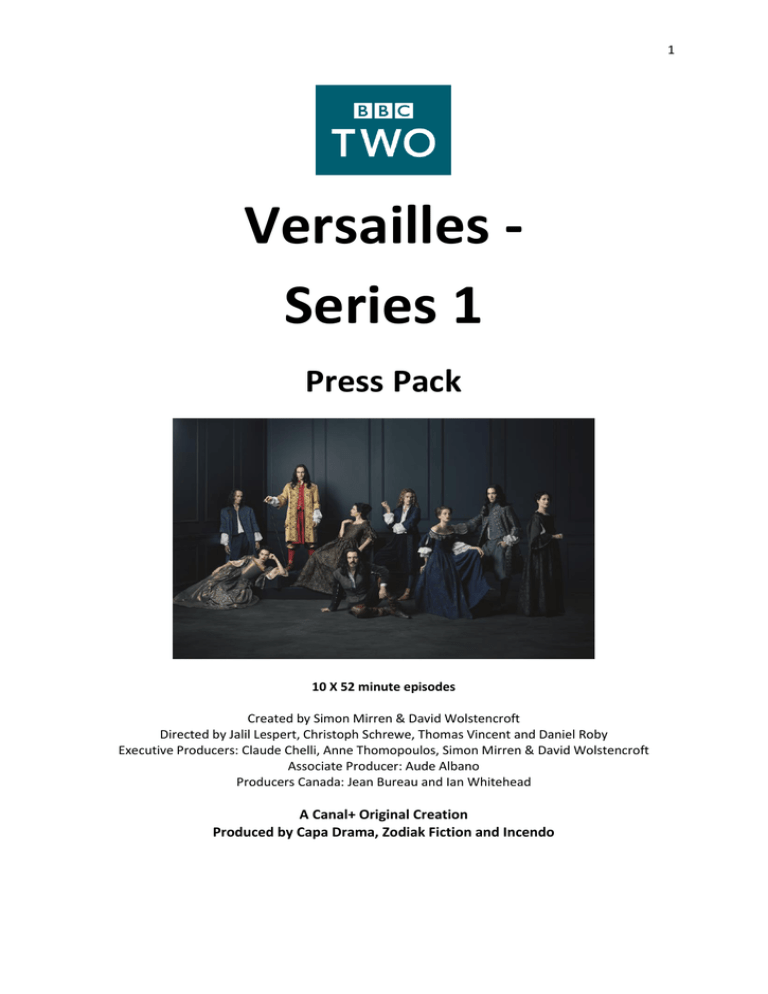
1 Versailles Series 1 Press Pack 10 X 52 minute episodes Created by Simon Mirren & David Wolstencroft Directed by Jalil Lespert, Christoph Schrewe, Thomas Vincent and Daniel Roby Executive Producers: Claude Chelli, Anne Thomopoulos, Simon Mirren & David Wolstencroft Associate Producer: Aude Albano Producers Canada: Jean Bureau and Ian Whitehead A Canal+ Original Creation Produced by Capa Drama, Zodiak Fiction and Incendo 2 CONTENTS Series Information – Page 3 Character Descriptions – Page 4 Interview with Simon Mirren and David Wolstencroft, creators of Versailles – Page 7 Interview with George Blagden (King Louis XIV) – Page 9 Interview with Elisa Lasowski (Queen Marie-Thérèse) – Page 11 Interview with Alexander Vlahos (Philippe) – Page 13 Interview with Sarah Winter (Louise de La Vallière) – Page 15 Interview with Jalil Lespert, director of episodes one and two – Page 17 Drama is all About Perspective, by producers Claude Chelli and Aude Albano - Page 20 A note on Versailles from Canal Plus – Page 22 Versailles Series 1 cast and production credits – Page 23 3 Series Information Versailles, France, 1667. Louis XIV is 28 years old. He will soon be recognised as the greatest of kings. A brilliant political strategist, Louis is haunted by the trauma of The Fronde, a bitter civil war in which the nobility rebelled against the crown. Determined to bring his rich courtiers to heel, and establish his absolute power, he devises an elaborate Machiavellian plan. He intends to transform his father’s hunting lodge into the most magnificent château in Europe, The Palace of Versailles. As well as protecting him, and providing a lavish setting for romance, it will keep the nobility away from Paris. They will realise too late it is a gilded prison. They are under the control of a master manipulator. Historical and fictional characters – flamboyant nobles, beautiful courtesans and humble servants guide us through this intoxicating world of secrets, betrayals, love and war. This is Versailles in all its brutal glory. Episode 1 France, 1667. Proud young King Louis XIV seeks to stamp his authority on court and country, but faces resistance and betrayal, even from those closest to him. Shifting the seat of power to a luxurious rural ‘lodge’ that he plans to enlarge only adds to his problems. Episode 2 Harsh steps must be taken to preserve the royal reputation, while flamboyant Philippe causes a stir of his own. The King hopes that humiliating a suspect noble will bring others to heel. 4 Character Descriptions Key Historical Characters King Louis XIV played by George Blagden At 28 years old, King Louis XIV of France is in sole command of his kingdom, following the death of his mother, Anne of Austria. Louis is a spirited and seductive man, an extraordinary strategist and an utterly ruthless statesman. He is haunted by childhood memories of a bitter coup, ‘the Fronde’, when the nobles attempted to overthrow his father, Louis XIII. Louis has a dream, an obsession: to build the most beautiful palace in all of Europe – Versailles. Symbolising all the splendor and glory of France, it is a place where he will be safe at last. The nobles crave entry to this lavish château, but its purpose is to imprison and control them. Versailles sees Louis XIV grow from a young King into an all-powerful absolute monarch. Philippe, Louis' brother played by Alexander Vlahos Louis’ younger brother Philippe, known as Monsieur, is a free spirit, an effeminate dandy and a ferocious warrior. To prevent him from overshadowing his brother, their mother raised Philippe as a girl and worked to curtail his natural leadership talents. A lover of art and beauty, Philippe walks the gardens of Versailles dressed as a woman and willingly submits to the sexual whims of his lover, Chevalier de Lorraine. On the battlefield, he is a formidable soldier, able to win the support of entire regiments. This does not fail to arouse immense jealousy in his brother. To further complicate matters, Philippe’s neglected wife, Henriette, finds herself in Louis’ arms. Henriette, Philippe’s spouse played by Noémie Schmidt Sister of King Charles II of England, Henriette, known as Madame, is the wife of Philippe and the mistress of King Louis. Henriette fulfills her duties with grace and elegance. A delicate English rose, fully aware of her dynastic obligations, she is a cunning politician and a force to be reckoned with. Abandoned by her husband and mistreated by Chevalier, she gradually loses the heart of Louis, who is under the spell of the sublime Madame de Montespan. Desperate to secure the love of her life, 5 she agrees to become a pawn on the political chess board, sealing the secret Treaty of Dover between France and England… such is the price of maintaining her position. Marie-Thérèse, The Queen played by Elisa Lasowski Marie-Thérèse is King Louis’ Queen. Desperate to win back the love of her husband, she has to be satisfied by the regularity with which he performs his conjugal duties, even having spent the evening with a more entertaining mistress. Marie-Therese is docile and pious. Her rigid Spanish education means she has few friends. An isolated, tragicomic character, she uses what others mistake for stupidity to hide her most intimate secrets. Chevalier, Philippe's lover played by Evan Williams Chevalier, Philippe’s male lover, is as handsome as he is toxic. Petty and manipulative, he is the perfect conspirator. He enjoys controlling his lover and constantly belittling his rival, Henriette. Louise de La Vallière played by Sarah Winter Louis’ mistress for many years, Louise de la Vallière feels she is gradually losing the King’s heart… yet she still loves him. Louis knows she is the only woman to ever love him for what he is, not for his crown. Louise knows that her adulterous relationship with the King, and the child she secretly bears, will be severely condemned by the church. The shy pregnant mistress becomes a penitent martyr. She begs the King to grant her exile from the court so she can seek refuge in a convent and reconcile with God. Madame de Montespan played by Anna Brewster Madame de Montespan is witty, graceful and probably the most ambitious woman at the court of Versailles. Married to the jealous Marquis, and lady-in-waiting to the powerful, she uses her position and her talent for repartee to reach her ultimate goal: Louis. 1667 will be the year when all her hard work finally pays off. Rohan, Louis’ childhood friend played by Alexis Michalik Rohan is Louis’ childhood friend. A notorious womaniser and talented warrior, he always cultivated a competitive relationship with his royal companion. Behind the friendly face there’s a much darker side to Rohan. Once denied a seat at the court by Louis, he returns harbouring extreme feelings of resentment and contempt. Bontemps, Louis’ First Valet and Governor of Versailles played by Stuart Bowman Bontemps is the warm and friendly Governor of Versailles. He considers it his duty to defend the King against all those who try to get near him. A rich man who sleeps each night at the foot of his master’s bed, he is the closest person to King Louis. As such, his loyalty is tested daily. Anne of Austria, Louis’ mother played by Dominique Blanc Anne of Austria brought up her son to become the greatest King of all. Though deceased, she lives on in Louis’ dreams and memories. Like having Machiavelli on his shoulder, she whispers advice, but soon the King will reject this ghost from his past. 6 Key Fictional Characters Fabien Marchal, Chief of Louis’ Police Force played by Tygh Runyan Fabien is the leader of King Louis’ Stasi-like police force. Officially reporting to Bontemps, Fabien sometimes receives his orders directly from the King, when Louis has needs he knows Bontemps cannot fulfill. Fabien is terrifying not only because of his intimidating physique, but because of his chilling eyes that see everything. He is a solitary man, emotionless it seems… until he meets Beatrice. Béatrice, Chevalier’s cousin played by Amira Casar Beatrice is a penniless widow who tries everything to get closer to her distant cousin, Chevalier, who she plans to use as a springboard to wealth and stature. Her trump card in this quest is her beautiful daughter, Sophie, “the fairest of all” at the court of Versailles. Beatrice is a secretive and manipulative woman. Fabien, blinded by passion, does not realise at first the true nature of his sulphurous conquest… Sophie, Beatrice’s daughter played by Maddison Jaizani Sophie, the beautiful daughter of Beatrice, is 16 years old. She is a girl full of dreams, an ingénue out to enjoy life and follow her passions. However, her mother has other plans for her – a strategy to ensure her daughter achieves a privileged rank in the court, with a place alongside the King. Soon, Sophie discovers that the glitter of Versailles hides a cruel and violent world… where one must abandon candor in order to survive. Montcourt played by Anatole Taubman Montcourt is a noble who took part in the rebellion against Louis’ father. An early victim of the Great Inquiry, Louis makes an example of him in front of the whole court. Montcourt turns bandit and discovers a whole new world of smuggling and violence. Recognising Montcourt’s thirst for revenge, Cassel entrusts him with an important mission: to destroy the Versailles project. The Duke of Cassel played by Pip Torrens Cassel is the rich and powerful Duke of Northern France. He doesn’t need anyone or anything… least of all a young king determined to set new rules. He refuses to acknowledge the Great Inquiry, to submit proof of his nobility or even to listen to the King’s messengers. He might be charming, but Cassel is also a skilled manipulator. He uses all means necessary to prevent Louis’ new order from becoming a reality, including sabotaging the construction of Versailles. Masson, the King’s Doctor played by Peter Hudson The local medic, Masson is abruptly promoted to royal physician, a key role at court. He is a nervous man, as panicked as he is honoured by his responsibilities. Together with his daughter, Claudine, he takes us behind the scenes at Versailles. Masson believes in 17th century medicine and wishes above all else to see Claudine happy and safe… but she is getting ever closer to the King. Claudine, Masson’s daughter played by Lizzie Brocheré Claudine is a modern woman trapped in the 17th century. Brought up by her father to observe and question the world, she refuses to marry for money. Her passion is medicine and, because this discipline is closed to women, she secretly develops her skills while working as a midwife. As she gains closer access to the King, the arguments with her father intensify. Their visions of medicine conflict and Masson can’t stand the humiliation. 7 A Universal Story by Simon Mirren and David Wolstencroft, Creators of Versailles What are two UK writers doing writing a show in English about a French king? The answer is very simple: Apple. The world knows what Steve Jobs did by building Apple into a force around the globe, but few know that without Louis XIV and Versailles, none of what we are witnessing today would be possible. Versailles was the Apple of its day, the world’s first truly global brand. Great stories are a global language and there are few greater or more all-encompassing than the story of Versailles. The Chateau de Versailles and the court of Louis XIV are part of the unshakeable bedrock of French history. For a moment, we admit, we were more than a little nervous of committing to the project, since we knew all too well what the French might think of seeing their historical legacy outlined in Anglo-Saxon idioms. But then we did something that is very useful in most circumstances. We stepped back, gained a little context, and remembered that Louis’ grandmother was a Medici, that his queen, MarieTherese, was Spanish, that his sister-in-law, Henriette, was an English princess. That’s when it hit us: The story of Versailles isn’t just a French story or even a European story, it is universal. For many of us, the first stories we were ever told featured a king in a castle in the middle of a forest. For us Versailles, while rooted deeply in French patrimonie, is a universal tale of the need for power and the need for control. When we approached the story of a young monarch centralising his power, we knew it was also the story of a young man attempting to conquer his demons and grasp some form of control over his life. We felt it would be intoxicating to see him battle these forces and succeed. We are, all of us, trying to build something, after all. Reading the history books it is easy to assume that Louis’ absolute power was wielded the moment he became King, that this was his birth right, ordained by the chronicles. In our opinion, this is far from the truth. His central transformation from a figurehead into a CEO is a fascinating study in what psychologists might call “ruthless dominance”, a project of sheer force of will that was forever poised on the brink of failure. Louis is still at this stage, one year after the death of his beloved but controlling mother, a man plagued by insecurity and flux in stormy and unsettled times. There was no telling which way his destiny would go. It was entirely up to him to seize his destiny from the ministers who had controlled him throughout his regency. In doing this, in many ways, he was moving from childhood to adulthood. 8 Our first season sees his coming of age of a monarch. As writers we have had many years of experience working on shows that have featured criminal psychopathology and other disorders of the brain. Thus we always saw the architecture of this show as inextricably linked to the architecture of Louis’ young mind - ambitious, traumatised, paranoid, borderline sociopathic and even psychopathic at times. The palace of Versailles is, in many ways, a map of the mind of a monarch. The establishment of Versailles as a centre of power away from the past, in Paris, was a masterstroke of realpolitik, as innovative, intelligent, modern and provocative as Louis XIV himself. What Louis created was not just a palace. It was a great cornerstone of culture, fashion, cuisine, as well as the secret police. But it wasn’t just Louis who held our attention. His brother Monsieur, Philippe Duc d’Orléans, seemed to us an extraordinary and uniquely modern character hiding in plain sight. He won us over completely. We’d simply never seen a character like him before, an openly gay warrior, a champion of the arts, a huge influencer of taste and fashion, in thrall to his lover (the manipulative Chevalier de Lorraine), a man who was forever in the shadow of his older brother. Louis’ enmity with his brother remains front and centre to our drama. Monsieur is a vast contradiction of willing passivity, bottled rage and, like his brother, sexual appetite. Between them sits Henriette d’Angleterre, the sister of an English king, one of the beauties of the age, Monsieur’s wife and, we postulate, Louis’ lover. This was a triangle we wanted to explore for 100 episodes! Enraged by his brother’s affair with his wife, he nevertheless continues his own homosexual affair with the Chevalier de Lorraine, and attempts to maintain control over Henriette through multiple pregnancies and psychosexual abuse. History is told by the winners and the majority of the stories that remain have been controlled in some way. What pressures lie behind them? In whose interest were they written? What we know of history is merely the tip of the iceberg. We wanted to write a redacted history of Versailles, the iceberg under the water… and the intrigues have only just begun. Simon Mirren is a British writer and producer. He started his writing career with the 1999 movie G:MT - Greenwich Mean Time. He then worked as a television writer on numerous hit British series, such as Waking the Dead, on which he was also producer. He played a key role in the first two series of Spooks (BAFTA for Best Drama Series in 2003), on which he was responsible for the research which gave the show its authenticity. He created and produced the miniseries Deep Blue for Channel 4 and in 2003, he moved to Hollywood where he worked as a writer for the series Without a Trace. He then joined the writing team of Third Watch, before working for six years on the series Criminal Minds, of which he became showrunner. He is also showrunner for the series The Sector, produced by Scott Free (the production banner of Ridley and the late Tony Scott) for cinemax. David Wolstencroft is a multi-award-winning British writer and producer. Born in Honolulu, Hawaii, he grew up in Edinburgh and studied at Cambridge, where he won the Edward Spearing Prize for history. His first work for television was the series Psychos (original idea and writer), which was nominated at the BAFTAs and earned him the Network Newcomer Award from the Royal Television Society. He then wrote the spy series Spooks for BBC1, which won several BAFTAs, and on which he met Simon Mirren. In 2013, the series The Escape Artist starring David Tennant was aired on BBC1 and earned Wolstencroft a nomination for a BAFTA Scotland award for his writing. Wolstencroft also wrote the screenplay for Shooting Dogs, the feature film directed by Michael Caton-Jones starring John Hurt and Hugh Dancy, which won the Grand Prix at the Heartland International Film Festival in 2006. 9 Interview with George Blagden (King Louis XIV) How did you prepare for the role of King Louis XIV? Quickly and in a panicked way! (laughs) I was cast about 4 weeks before we started filming and I was shooting a different television series in Ireland at the time and I actually finished filming on that series on the Friday, came over to Paris on the Saturday for costume, hair, makeup and rehearsals on the Sunday, and then started filming Versailles on the Monday. So the joke is I had a weekend to prepare for the most powerful monarch in European history! Though I did as much research as I could have done in those four weeks and I very much trusted in David and Simon’s writing. Knowing their vision for the show, I felt in very safe hands. Can you describe King Louis XIV’s relationship with his brother? Complex. I think it’s a real pillar for what drives the narrative of the show. I think that basically Philippe’s character is a very, very interesting one which effects Louis greatly - and vice versa. I really enjoy watching scenes between them and seeing what happens behind closed doors with them. It’s very powerful, this brotherly relationship. You have lots of elements of love and hatred and anger and betrayal and I think Alex does an amazing job with Philippe. I really think when I’m doing scenes with Philippe there’s this great chemistry that’s kind of accidental and I don’t think anyone foresaw. It allows for lots of unspoken understanding between me and him of how we’re going to portray these brothers. In short I think he makes me look very good, and I’d like to hope to think that the reverse is the same and that when we’re on set together the relationship is very powerful. How about his relationship with his wife? It’s a very interesting relationship because it was an arranged marriage and they married when they were teenagers I think. Of course it was a very political marriage to enable relations between France and Spain to go smoothly, and that as a starting point for a relationship can be quite difficult. I think that of all of the women in Louis XIV’s life he has a great deal of respect for Marie-Therese and at no point does their relationship become jeopardised by this knowledge that they’re union was initially for political reasons. They have become fond of one another as a result. What can BBC2 viewers expect from Versailles? 10 They can expect lots! It’s very much an attempt from all of us to try and put a different light on this period of history and show it in a way that really relates to a modern audience. I think the way that we’ve been able to play with the historical facts and put pieces in between those facts that are very dramatic and very human really means that the audience will be able to identify with this world and these people. And everyone will have a different favourite character – there’s not one favourite character that everyone will come away with from the show liking. It’s a real ensemble cast that delivers, in my opinion, a very powerful story. What were your highlights of shooting series 1? I don’t think I have an hour and a half to tell you! There were so many. There was one moment at the start of series one – on our first day of shooting at the real Palace of Versailles, on a Monday when it’s closed to the public. We had ten minutes at the end of the day and we really wanted to film this monologue of Louis talking to camera in The Hall of Mirrors. Almost a ‘Frank Underwood from House of Cards’ vibe, but in a dream sequence envisaging what Versailles would one day become. We decided to have a go at recording it with ten minutes left of the day. I quickly went and changed into this different outfit and came back out into the hall of mirrors with five or six minutes to shoot this monologue. At that exact moment the sun dropped down underneath the clouds and this beautiful bright orange light flooded in through all of the windows into the hall, bounced off all the mirrors and the room was just literally golden. It was on the 400th anniversary of Louis XIV’s death and it felt as if everyone in the room had this spine-tingling feeling of ‘Wow - we’re doing something quite special here”. I delivered the monologue - I had two goes at it - and it’s there for viewers to see in the final cut of episode 1. I think it doesn’t get much better than that as an actor. I’m just blessed to have been given an opportunity like this show. 11 Interview with Elisa Lasowski (Queen Marie-Thérèse) Where do we find Queen Marie-Thérèse at the beginning of Versailles series 1? At the beginning of series 1 Marie-Thérèse is confined to a room, because she is pregnant. Back then this was the case with many women in the later stages of pregnancy to protect their unborn baby and to protect the woman too. So Marie-Thérèse is confined to a room at Versailles just about to give birth, and alongside this she has to endure living with the King’s mistresses. One of whom is Louise de La Vallière (played by Sarah Winter), who’s been the King’s mistress for at least a good six years at that stage and is also having children with him too. The baby Marie-Thérèse is about to have is not her first, either – she’d had children with the King before this point. Could you describe Marie-Therese’s relationship with King Louis XIV (George Blagden)? Marie-Thérèse is the King’s cousin. They were cousins twice over actually – as both the father and mother were already cousins. A lot of the marriages at the time were alliances between cousins in fact. Marie-Thérèse knew from a young age that she’d probably be marrying Louis, and even had a portrait of him in her court back in Spain. She used to walk past him when she was a young girl and giggle and say she loved him, so you could say that she grew up conditioned from a young age knowing that Louis would likely be her husband one day. Marie-Thérèse was genuinely in love with the King. She genuinely loved him and was very unhappy that he was deceiving her, and she was always hoping that he would come back. Louis had made a promise that he would always return each evening to retire in her room, and she always held him to that and was always disappointed when it didn’t happen. I think she went through her life saying “you promised, you promised, you promised!” In her relationship with the King, she was very much the shadow to the sun. Whereas some historians were not interested in Marie-Thérèse because the tabloid newspapers at the time were much more interested in King Louis’ mistresses, many are now saying that Marie-Thérèse was actually a lot smarter and a bigger influence than some others would give her credit for. She was 12 trying to create an equilibrium with the King and keep him grounded – he was often so ‘far out’ in his approach that she would try to create a balance in a more ordered way. How much did you know about Versailles and the Court of King Louis XIV before you started filming? Is there anything you’ve discovered from working on the show that has surprised you? I’m French, but I grew up in the Netherlands. I went to an international school where I started to learn English from the age of seven, which is why I’m bilingual and I speak Spanish as well – hence me being cast as Marie-Thérèse. I have a lot of languages! At the school I was in we learned European history, and though I don’t think I learned as much about Louis XIV as I would have if I was in a French school, I did know about European history in this period. When I got the role of MarieThérèse I spent quite a bit of time at the British Library looking through books on that period, because I thought it was the perfect opportunity to delve into a world I didn’t know all that much about. I learned loads, as you would when you start to research that closely. Marie-Thérèse is widely credited as bringing the orange to France and making it a popular treat. She also used to drink chocolate – she was well known for that. There’s loads – and I mean loads - of details and historical enigmas that I found out. Finally, what have been the most enjoyable elements of working on Versailles for you? We’re used to it by now, but initially it was obviously the costumes and the hair and the wigs. They’re just fascinating to see close up. As is the way they create the wigs - they sew them one hair at a time, and the costumes are all made to measure too. Marie-Thérèse’s costumes have got incredible little details that you’d never catch on the camera but you see close up. The spectacle of it all was so amazing thanks to the incredible locations we were filming at. So many stunning castles and different locations around Paris, plus the interiors - the reconstructions of the palaces - that we’ve done in studios are just amazing to see. You look at the tapestries they’ve used for the wall and the fake marble that they’ve created that looks so real. It’s just unbelievable. Now we’re doing series 2 we’ve become quite used to it, but it’s still just as fascinating. We’re also very lucky because we have an amazing cast and crew - who are all so nice and we all get on - which is kind of miraculous. Everyone is just wonderful and that’s really enjoyable because there’s always a really good vibe on set, which is really important for such a big show. 13 Interview with Alexander Vlahos (Philippe) Tell us about Philippe as a character. Philippe is the younger brother of Louis XIV, the King of France. He is a 26 year old effeminate dandy but he’s also described as a warrior so he has a sort of duality in his personality. Although he’s homosexual, he has a wife, Henriette - the sister to Charles II of England. She’s also the King’s mistress, so they really were one of the first dysfunctional families! It’s very confusing, at least on paper, but an absolute joy to play! He wears women’s clothes, and he was brought up wearing women’s clothes from the age of 3 months old so he wouldn’t be a ‘threat’ to Louis and the crown. But in doing so it’s actually made him more powerful, more extraordinary I guess. He’s a gift of a character to play. When I first got the part they described him as a 17th Century David Bowie. When I read that I thought “I can do that! I can give that a go!” That description really sums him up. Funnily enough, the first director, for in certain scenes, would give me notes along the lines of “do you think you could do this a bit more like Iggy Pop? Do you think you could do it a bit more like The Stooges?” And I think he got exactly how I work as an actor and how my brain works. Rather than a note for delivery of specific lines, he focussed on the general quality of the person I could bring to Philippe. Extraordinary, a little bit ‘out there’, a little bit otherworldly. How strong is his relationship with his brother? I think it’s the strongest relationship in the show – the relationship between Louis and Philippe. They have a sort of undying brotherly love between each other, but it’s also contested. They have friction as any brothers do – as any younger brother does. It is the heartbeat of the show, for Versailles, in terms of where they are with each other and how much respect they have for each other. Like many a younger brother, he’s always looking and vying for his big brother’s confirmation, his brother’s attention and his brother’s approval. And when he gets it he plays with that. Their relationship is I think the most important thing in Versailles. 14 How do the two brothers differ from one another? Louis is very conscientious, but also very closed. He doesn’t show his emotion because he’s a King and it’s seen as a sign of weakness. With Philippe he doesn’t have that overbearing sense of consequence so he gets to say what he thinks without any concern. He has no responsibility which is actually a very good thing for a younger brother. In terms of responsibility it’s a little bit like with William and Harry – the younger brother gets to have all the fun! And I have all the fun playing him. Whereas Philippe is over the top sometimes, he’s also very passionate, he’s very caring, he says what he thinks and that makes him very caring open for criticism I guess from the French court. He’s a thorn in his brother’s side, but also he is his only brother so he’s everything to him and nothing at the same time. It’s difficult, it’s tricky - it’s a complicated relationship! What can BBC2 viewers expect from Versailles? Grandeur, incredible acting, incredible sets, beautiful costumes… I have never been more proud of something I’ve worked on than I am Versailles, and I think it’s going to blow UK viewers’ socks off. It’s rock n’ roll and I’m super happy that it’s on the BBC. 15 Interview with Sarah Winter (Louise de La Vallière) What attracted you to the role of Louise? I didn’t know much about Louise de La Vallière before, but as soon as I was given the role I did a huge amount of research and then was thrilled to be playing her because she’s a fascinating character in history. So troubled, so intriguing, and in France she’s so iconic that I wanted to get her right. For an actor to play any role that’s so troubled and layered is very exciting. She’s constantly torn all the way through the series between her two sources of conflict – her relationship with the King and her relationship with God. She's also quite a misfit in court - never joining in with the manipulative power games, and that really fascinated me. What attracted you to the series? I was taken to the Palace of Versailles when I was about 8 and remember thinking how overwhelming it was - like a whole little world inside the Palace. And I remember thinking the Hall of Mirrors was just magical. Discovering a whole series was going to be set there was a definite attraction, but it was the characters - some that you can't quite believe existed - and the thrilling, contemporary storytelling that attracted me most. What was it like to work on a show of such huge scale? Pretty overwhelming, in the best possible way. It’s so filmic. The sets are on such an epic scale that it looks and feels more like a film than a TV set. And to actually be at Versailles Palace to film on some days was just bonkers. There was one day we were filming there with tons of extras and a huge golden carriage in front of the palace and I almost forgot my lines, because it was all so surreal. The whole cast were very aware of the production values and the scale of this series the whole time, because everything is so beautifully, carefully done - so detailed and so lavish. What do you think sets Versailles apart from other historical drama on TV? Versailles has got all the best elements of a traditional costume drama, but here they’re seen through a more contemporary lens. The shooting style is quite different - the camera will sometimes 16 go everywhere - and then you’ve got this fresh modern soundtrack. It feels slightly more dangerous than some more traditional costume dramas and really has an intense edge to it. What have you found so rewarding about working on Versailles? So much! The cast are just incredible; it’s a real privilege to work with so many exciting actors, and the showrunners, David and Simon, are just brilliant and kept coming up with new ideas all the time. And the scale of it all was just epic from beginning to end. It was like time travelling back to the best house party where anything could happen. 17 Interview with Jalil Lespert, director of episodes one and two What approach did you take to directing Versailles? I joined the project when the narrative arc of season one, and the writing of the first two episodes, were already finalised. But everything was still to be done in terms of directing, which I thought was a fascinating challenge. We had to find an identity for Versailles. I came at it straight off the back of my film Yves Saint Laurent. I didn’t hesitate for a moment, because I find television fascinating. I’m intrigued to see how it will develop in years to come, because there’s so much going on, and not only in the United States, where TV is outshining independent cinema. It was like being let loose in a playground. I see this series as a hybrid work, combining French savoir-faire with Anglo-American writing, if not exactly in the Hollywood style. The interesting part was matching up the way we make series in France and the scale of an international series. What were the main challenges? To be perfectly honest, it was a difficult project to handle, with some extremely dense writing, although personally I love the American culture of the script, which we don’t have in France. In a single episode of Versailles, so much is going on. We had the necessary time and a pretty generous budget, without being exorbitant. The equivalent series would have cost three times as much in Britain or the US. But we wanted to shoot here in France. It was hard to imagine filming 17thcentury chateaux anywhere but in France and, deep down, I really wanted to keep this huge project on our territory. It meant jobs for six hundred people for one year, and it seemed, above all, essential to benefit from French savoir-faire in terms of costumes and set design. That expertise is invaluable. Every morning, I thought: this is a bit crazy, but it’s also really audacious. What attracted you to directing a drama about this period of France’s history? The script is not remotely in awe of French history, and I love that. There is not even a hint of the idea of protecting our heritage. Certain events are totally insane and to begin with I thought they 18 were pure fiction, yet they really happened. I’m mainly alluding to the cliffhanger at the end of the first episode, which I won’t reveal. But what I loved most was the Shakespearian dimension of the text. To illustrate this, I was thinking in particular of Patrice Chéreau’s Queen Margot, because I was looking for a kind of timeless modernity. I wanted the actors to perform without filters, so the viewer would forget the wigs, the costumes and sets. Rigidity is always the danger in historical drama. Here, we’re dealing with a young court, that of a king who was not yet 30 years old who had decided to assert his power. He was born a king, but he hadn’t yet really become one. For me, it’s like Louis XIV meets the Godfather. I thought of Michael Corleone, and I wanted to approach it in this way. What aspects were you seeking to bring out in this young king as he tried to assert his authority? Firstly, the dichotomy between the grandeur of royalty, and its excesses, and that fresh youthful aspect, which is a bit rock ‘n’ roll. The members of the court were born into this. They developed a sort of couldn’t-care-less attitude, a nonchalance that is fascinating to watch. Depicting power is always rewarding. I didn’t want to slip into a decorative temptation, but to show this splendor in an unabashed way. As for the King’s personality, I was mostly attracted to his paranoia. When you’re born to rule and you have power, you have enemies, everywhere. Versailles is a fascinating closed world. I did some research on daily life in the court: it’s more like an ancient Oriental culture, not at all like the France that we know. It’s as far removed from the world I know as the rituals of ancient Egypt. The King embodied the divine on Earth. That’s quite special, being born as God’s representative on Earth! That makes for a captivating character with a broad spectrum. The cast is very original. That was one of my first concerns: putting together a very young cast, totally free from any notion of “bankability”. We saw around 200 potential Louis XIVs, and as many for Philippe d’Orléans. George Blagden and Alexander Vlahos, the two actors we chose, won us all over thanks to the extra something they both have. They are amazingly talented, despite being so young. I asked George to look at Pacino’s work in The Godfather, since his character’s journey in the first season is quite close to that of Michael Corleone. I explained to him: “You see, Pacino isn’t yet the Godfather; he’s going to become him.” George hadn’t seen it. I realized that to him, it’s an old film. That made me suddenly feel quite old, but it’s exactly that youthfulness we needed for this project. The core of the first season is the relationship between the two brothers, Louis XIV and the Duke of Orléans. They had a love/ hate relationship built on competition, but also on an absolute loyalty. Where exactly was the series shot? In several locations, including the chateau of Vauxle-Vicomte and Versailles, although the Versailles of the time is not really the one we know today, with its baroque style. After Louis XIV, each king gave the Palace a makeover. At the start of the series, Louis undertakes a huge building programme to transform Versailles into a dream palace. One can see the dichotomy between his dream and the reality in a scene in the first episode. In the Hall of Mirrors, the King outlines his plans for the chateau before a dubious court. He believes in it, even if it’s no more than a pipedream for the 19 moment. You also have to remember that moving the court from the Louvre to Versailles was his first major political manoeuver. There is a dream-like dimension to Versailles. Yes, it gets inside your head, because a lot of things are based on the King’s paranoia and the notion of being shut away in this chateau, which was at the time just a hunting lodge in the middle of woodland and marshes. Hundreds of people lived packed-in together, and there was all this work going on ordered by the King. They lived in a very claustrophobic world. I tried to bring out Louis XIV’s almost sociopathic side, but without slipping into a universe that is too unsettling. Did you enjoy filming Versailles? Yes, of course. It contains some fabulous characters for a director. The King is not the only one with an intriguing personality. His brother, Philippe d'Orléans, is also amazing. Louis had a very unusual relationship with his gay brother, who would cross-dress at court. It was accepted. He had an official male lover, while his wife, Henrietta of England, was the King’s favourite mistress. I hope we have pulled off the challenge of getting inside this family that was, on the one hand, very peculiar, and on the other, so familiar. Jalil Lespert began his career as an actor in 1999 in Laurent Cantet’s first feature film, Human Resources, for which he won the César award for Best Male Newcomer. He followed this up with a string of varied roles: a sensual gardener in Sade; a bodybuilder in Vivre Me Tue; and a gigolo in Pas Sur La Bouche. He then appeared in Le Promeneur Du Champde-Mars, Virgil, Le Petit Lieutenant, Tell No One and Le Voyage En Arménie. More recently, he starred in the series Pigalle la Nuit, and the films Un Baiser Papillon, Love and Bruises, Landes, De Guerre Lasse, and Premiers Crus, directed by Jérôme Le Maire and co-starring Gérard Lanvin. Lespert made his directing debut in 2007 with 24 Mesures. He then adapted Olivier Adam’s novel Des Vents Contraires for the big screen, starring Audrey Tautou and Benoît Magimel. His most recent movie as director was the biopic Yves Saint Laurent starring Pierre Niney and Guillaume Gallienne, which earned seven César nominations in 2015. 20 Drama Is All About Perspective by Claude Chelli, producer for Capa Drama, and Aude Albano, Associate Producer for Zodiak Fiction Versailles is not only a palace built by Louis XIV as the theatre in which to stage his own glory. Versailles is France itself, a symbol of its refinement, culture and prestigious history. What excited us about this series was the idea of reinventing period drama by trying to understand what lies behind the myth, by exploring the gaps in the official history. Versailles became a brand, known throughout the world, which conveyed the power of the monarch’s divine right. The careful crafting of this myth demonstrates that Louis XIV was a true master of promotion. Each of Louis XIV’s acts were recorded in meticulous detail by the correspondents of “La Gazette”, founded by Théophraste Renaudot, of which 80,000 pages were published between 1638 and 1715. But what do we really know about his inner thoughts, his fears, doubts and anxieties? This is the area where fiction can flourish, by getting right up close to the characters, by making them human, allowing empathy and inspiring emotion. Drama is always a matter of perspective. Why did Louis XIV decide to leave Paris for Versailles? Why would he want to abandon the magnificent royal apartments of the Louvre, Fontainebleau, and Saint-Germainen-Laye to set up his court in this place “of woods and scrubland”, around his father’s hunting lodge? The answer is, quite simply, because one never really gets over the traumas of one’s childhood. We cannot understand Louis XIV’s thought processes if we don’t understand the events of the Fronde. The young King Louis was only 10 when the monarchy suffered a coup d’état instigated by the brother of Louis XIII, Gaston d’Orléans, and backed by the nobility and the princes. Louis would never forget that night, when the royal family had to flee the Louvre and seek refuge far from the comfort of the royal apartments. Throughout his 72-year reign, he would never cease taking revenge on this seditious group, and keeping down his brother, Philippe d’Orléans, known as "Monsieur", whose very existence threatened his authority. 21 Versailles stands in stark contrast to the official accounts. History forms the backdrop, and is depicted faithfully, but it is the characters who carry the narrative. The King’s heart and mind is the driving force. Drama is particularly important during the clashes and power struggles, when the characters reveal their true selves and destinies are decided. When the series starts, the King is only 28, still haunted by his childhood traumas, weakened by the death of his mother. He’s a young king under threat from all sides, from the outside - the war against the Spanish Netherlands - and from within, from the nobles. An exceptional political strategist and Machiavellian manipulator, Louis XIV would invent Versailles for his own ends. His aim was to divert the nobles away from Paris and keep them under his control in Versailles, the whole estate being under surveillance by spies in the service of the King. He set very strict rules for court life, which came to define etiquette. We follow him as he sets the trap that will close on his nobles, gradually turning Versailles into a gilded prison. When our story begins, Versailles is not yet a sumptuous palace, but a simple hunting lodge. Louis XIV transforms it into a vast building of marble and gold. In terms of the timeline, this work is completed at the end of the first season. Through the series, we bring an innovative point of view to the historical drama, one that is intelligent, modern and provocative, as envisaged by Simon Mirren and David Wolstencroft. Once it was decided to film in English to ensure the widest possible international distribution, Simon and David quickly emerged as the obvious choices. Simon is one of the writers and producers of the CBS series Criminal Minds, and David is the creator of the series about the British secret service, Spooks. They probe the human soul, the turbulence of paranoia, and disturbances of the mind. Their subtle and original writing provides a valuable glimpse into Louis XIV’s inner battle. What’s more, David studied the 17th century and the court of Louis XIV at Cambridge University, so he brings a valuable academic understanding. 22 A Compelling Subject Combining the Intimate, Political, Historical and Romantic by Fabrice de la Patellière, Dominique Jubin and Pierre Saint-Andre French Drama Department, Canal Plus The year is 1667 and Louis XIV was a young king of 28 when he decided to move his court to Versailles. This decision was much more than a foible; the move constituted a major political and historical shift, effectively reinventing the French monarchy. Versailles would become the embodiment of royal absolutism for the 72 years of Louis’ reign. In addition to being a fabulous setting, the Palace itself provides the series with some fascinating raw material, interweaving the intimate and the political, the historical and the romantic. The creativity and freedom with which David Wolstencroft and Simon Mirren handled these different aspects was refreshing, a result of their unique viewpoint as expatriate British writers based in Hollywood. While respecting the historical framework, the screenwriters played around with it, treating Louis XIV as the hero in a TV series, painting an original portrait of the young monarch far from the conventional representations of the Sun King. They created a bright canvas which shines new light on both the characters and the period, where, as in the work of Alexandre Dumas, fantasy has its place. Shooting in English had the advantage of making financing easier, which allowed us to achieve production values akin to the most ambitious international series. Versailles is all about the young lives of these characters, played by a brilliant generation of British, Canadian and French actors. The King and his closest advisors were still under 30. The responsibility weighing on him was immense. The enemy was at the gate. The memory of the Fronde was fuelling the most outlandish conspiracies, but, at the same time, romantic intrigue lay behind every door. George Blagden, Alexander Vlahos, Amira Casar, Noémie Schmidt, Anna Brewster and the rest of the cast carry the series with talent and vivacity. The production team at Capa Drama, under the direction of Claude Chelli, shot the Palace interiors in Bry-sur-Marne studios and obtained access to some stunning French buildings for the exteriors. They succeeded in bringing together the best expertise in all departments, including costume design (Madeline Fontaine), set design (Katia Wyszkop), and cinematography (Pierre-Yves Bastard). Jalil Lespert injected verve and energy. We are delighted to have commissioned, along with Capa Drama and Zodiak Fiction, the writing and production of the second season. 23 Versailles Series 1 - Cast and production credits Louis XIV George Blagden Philippe Duc d’Orleans, ‘Monsieur’ Alexander Vlahos Fabien Marchal Tygh Runyan Bontemps Stuart Bowman Béatrice Amira Casar Henriette Noémie Schmidt Madame de Montespan Anna Brewster Chevalier Evan Williams Louise de La Vallière Sarah Winter Colbert Steve Cumyn Louvois Joe Sheridan Marie-Thérèse Elisa Lasowski Masson Peter Hudson Claudine Masson Lizzie Brocheré Sophie Maddison Jaizani Jacques Gilly Gilchrist Montcourt Anatole Taubman Rohan Alexis Michalik Cassel Pip Torrens With Dominique Blanc in the role of Anne of Austria. Series Creators Simon Mirren & David Wolstencroft Executive Producers Claude Chelli, Anne Thomopoulos Simon Mirren & David Wolstencroft Associate Producer Aude Albano Producers Canada Jean Bureau & Ian Whitehead Director Episodes 1 and 2 Jalil Lespert Director EpisodeS 3, 4 and 5 Christoph Schrewe Director Episodes 6 and 7 Thomas Vincent Director Episodes 8, 9 and 10 Daniel Roby Writers Simon Mirren & David Wolstencroft André Jacquemetton & Maria Jacquemetton Sasha Hails, Andrew Bampfield Director of Photography Pierre-Yves Bastard Production Designer Katia Wyszkop Costume Designer Madeline Fontaine International Sales (Except Canada) Zodiak Rights
